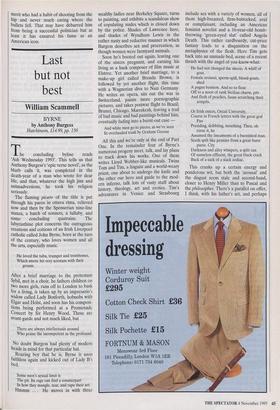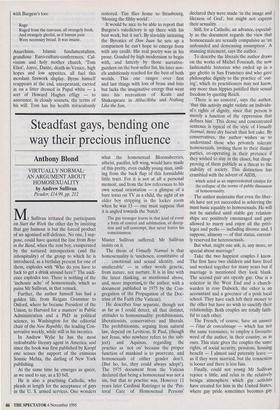Last but not best
William Scammell
BYRNE by Anthony Burgess Hutchinson, £14.99, pp. 150 The concluding byline reads `Ash Wednesday 1993'. This tells us that Anthony Burgess's 'epic verse novel', as the blurb calls it, was completed in the death-year of a man who wrote for dear life, and that, whatever the high jinx and animadversions, he took his religion seriously.
The flaming picaro of the title is put through his paces in ottava rima, relieved now and then by the Spenserian nine-line stanza, a batch of sonnets, a lullaby, and some concluding quatrains. The labyrinthine plot concerns the outrageous creations and coitions of an Irish Liverpool catholic called John Byrne, born at the turn of the century, who loves women and all the arts, especially music.
He loved the tuba, trumpet and trombones, Which smote his very scrotum with their groans.
After a brief marriage to the protestant Sybil, met in a choir, he fathers children on two more girls, runs off to London to busk for a living, is taken up by an impresario's widow called Lady Boxforth, hobnobs with Elgar and Ho1st, and soon has his composi- tions being performed at a Promenade Concert by Sir Henry Wood. These are avant-garde and not much liked, but
There are always intellectuals around Who praise the incompetent as the profound.
No doubt Burgess had plenty of modern heads in mind for that particular hat. Roaring boy that he is, Byrne is soon faithless again and kicked out of Lady B's bed.
Some men's sexual limit is The pit. Its rage can find a counterpart
In how they mangle, tear, and rape their art. Hmmm. . . He moves in with three wealthy ladies near Berkeley Square, turns to painting, and exhibits a scandalous show of copulating nudes which is closed down by the police. Shades of Lawrence here, and shades of Wyndham Lewis in the rather nasty and reductive manner in which Burgess describes sex and procreation, as though women were farmyard animals.
Soon he's booted out again, leaving one of the sisters pregnant, and earning his living as a hack composer of film music at Elstree. Yet another brief marriage, to a make-up girl called Brenda Brown, is followed by yet another flight, this time with a Wagnerian diva to Nazi Germany. He writes an opera, sits out the war in Switzerland, paints more pornographic pictures, and takes postwar flight to Brazil, Brunei, Chicago, Marrakesh, leaving a trail of bad music and bad paintings behind him, eventually fading into a burnt-out case -
And white men go to pieces, as we've seen In overlauded trash by Graham Greene
All this and we're only at the end of Part One. In the remainder four of Byrne's numerous progeny meet, talk, and lay plans to track down his works. One of them writes Lloyd Webber-like musicals. Twins Tom and Tim, a linguist and a world-weary priest, one about to undergo the knife and the other our hero and guide to the mod- ern inferno, talk lots of vasty stuff about history, theology, art and erotics. Tim's adventures in Venice and Strasbourg include sex with a variety of women, all of them high-breasted, firm-buttocked, avid or complaisant, including an American feminist novelist and a 16-year-old bomb- throwing 'green-eyed slut' called Angela Death. This rather cardboardy, cut-price fantasy leads to a disquisition on the metaphysics of the flesh. Here Tim gets back into an unmade bed, scene of a recent thrash with the angel of you-know-what:
He had not changed the sheets. A whiff of goat, Female arousal, sperm-spill, blood-gouts, shed A pagan benison. And so to float Off to a noon of rank Sicilian charm, pits And flesh of peaches, fauns scratching their armpits.
Or Irish oxters, Oxtail University, Course in French letters with the great god Pan Presiding, dribbling, mouthing. Then, oh curse it, he Assumed the lineaments of a burnished man. Seeds spilt like pennies from a great burst purse. City Darkness and alley whispers, a split can Of nameless effluent, the great black crack Back of a sack of a slack zodiac.
This cranks up a certain energy and ponderous wit, but both the 'arousal' and the disgust seem stale and second-hand, closer to Henry Miller than to Pascal and the philosophes. There's a parallel on offer, I think, with his father's art, and perhaps
with Burgess's too: Rage Raged from the canvases, all strangely fresh, And strangely gleeful, as if human pain Were necessary bread. It was insane.
Anarchism, Islamic fundamentalism, grandiose Euro-culture-conferences, Cal- vinism and holy mother church, 'Tom Eliot', Joyce, Dante, death-in-Venice, high hopes and low appetites, all fuel this mordant firework display. Byrne himself reappears at the end, unrepentant, carried in on a litter dressed in Papal white — a sort of Howard Hughes effigy — to announce, in cloudy sonnets, the terms of his will. Tom has his health miraculously restored. Tim flies home to Strasbourg, `blessing the filthy world'.
It would be nice to be able to report that Burgess's valedictory is up there with his best work, but it isn't. By slavishly imitating the Byronics of Don Juan he sets up a comparison he can't hope to emerge from with any credit. His real poetry was in his prose. Goaded by high modernism to begin with, and latterly by those narrative- guzzlers on the best-seller list, his later nov- els ambitiously reached for the best of both worlds. This one ranges over first and last things with lots of brass and brio but lacks the imaginative energy that went into his recreations of Keats and Shakespeare in Abba/Abba and Nothing Like the Sun.











































































 Previous page
Previous page